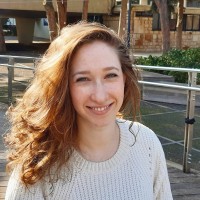

LA JOLLA, California — Technion student Polina Bronov, speaking to residents of the Vi senior living community on Friday, told of her life before and after enrolling at the university often described as Israel’s MIT.
Her parents had immigrated to Israel from the former Soviet Union. She grew up in Israel. After high school, she competed in the aggressive sport of roller hockey and spent two years in the IDF, before enrolling in the highly competitive Technion, which is located in Haifa, Israel. She speaks perfect English. Technion pioneers in informational systems and artificial intelligence.
During her schooling, she volunteered in a number of extracurricular administrative functions available to undergraduates. School itself is a high pressure competitive experience, which takes its toll on all, she said. For the first two years, there is little time for more than classes and study.
Her graduation project in Technion’s School of Industrial Engineering and Management, laden with high tech techniques, is to create an information system to analyze the inside workings of non-profit companies. Via internal and complex data processing, the goal is to rate a target institution on multiple scores of effectiveness, which includes exposure of illegal activities.
Bronov’s personal intention is to pursue a career which bridges her science knowledge with the human functions of project management.
She answered questions from the audience. Among them was the issue of stress among Technion’s students leading to depression, not unlike that observed in USA college students. Technion is alert to this, offering emotional support plus recreational, fitness, and social activities. However, unfortunately individualized psychotherapy is not readily available. Waiting periods are typically six months for a first appointment. Nevertheless the school makes great efforts to keep students on board, all the way to graduation. Technion sustains a high graduation rate.
Bronov briefly summarized the work of fellow student Shimon Sheiba, because of illness forced cancellation of his appearance, sponsored by the San Diego chapter of the American Technion Society. Sheiba’s project deals with personalized treatment of Diabetes Type II. His technique involves intensive artificial intelligence (IA) assessment of a treatment record, to enable creation of advice to treating doctors on optimal subsequent sequential treatments.
An introductory video offered basic statistics about the Technion. It has an enrollment of 14,000 students, of which 5,000 are female. The enrollment includes Palestinians and numerous foreign students. Israelis’ tuition is subsidized by the government, with out-of-pocket costs to students about $5,000 annually. There is a growing female component to the faculty, including heads of departments.
Technion has 18 different faculties, including Schools of Medicine, Engineering, Biology, and the Social Sciences. Three of its faculty members have earned Nobel Prizes.
One proud achievement was identification of the elusive ‘quasicrystal’ for which Technion Distinguished Professor Dan Shechtman won the 2011 Nobel Prize in chemistry. The quasicrystal is a crystal-like structure, imperfect as to symmetry, which likely has applicable useful properties. Like the famous double helix of DNA, it was found via X-ray crystallography.
The Na-Nose is another achievement, first reported in 2014. Like a super-sensitive human nose, this technology can “smell” to identify the chemical composition of a person’s breath to detect emanations from disease. This tool can diagnose up to 17 pre-clinical diseases. This development was led by Dr. Hossam Haick, an Arab Technion professor. The Na-Nose uses intelligent ‘nanoarrays’ to analyze breath, from which it can identify Parkinson’s disease, various cancers, kidney failure, multiple sclerosis, Crohn’s disease, etc. with 86% accuracy.
*
Irv Jacobs is a retired medical doctor who enjoys writing about a variety of interests, including both religion and science. He may be contacted via irv.jacobs@sdjewishworld.com